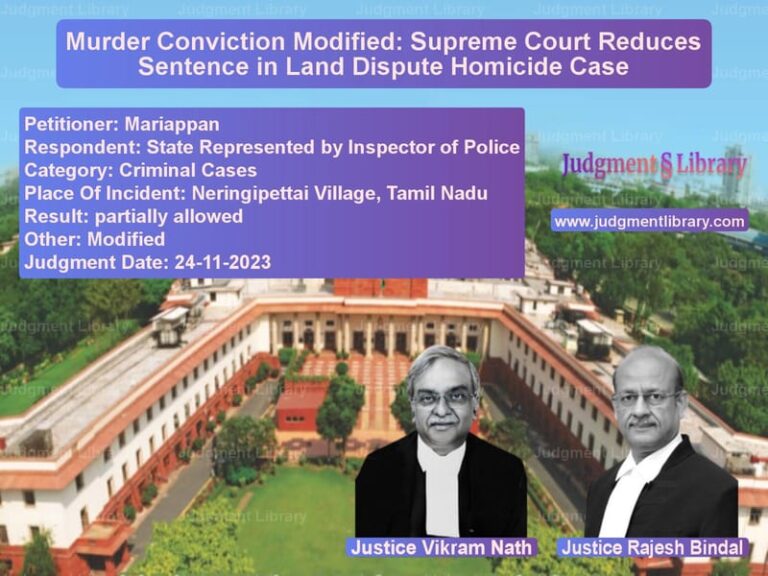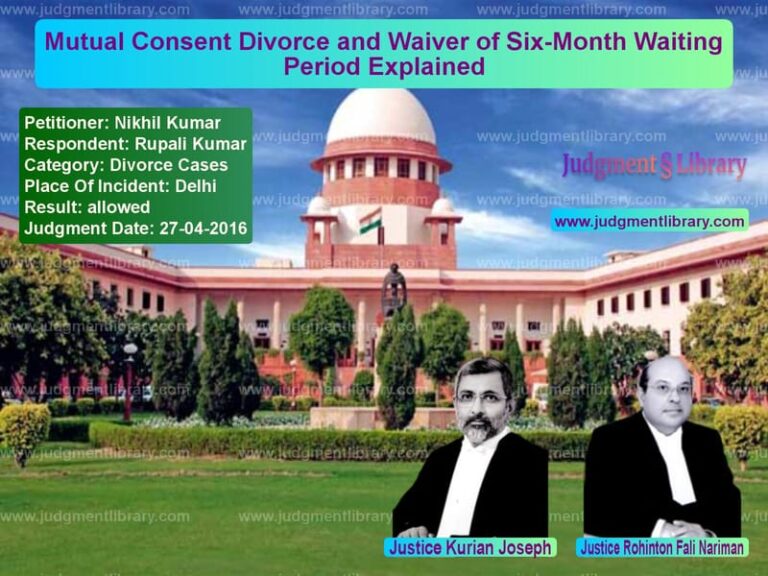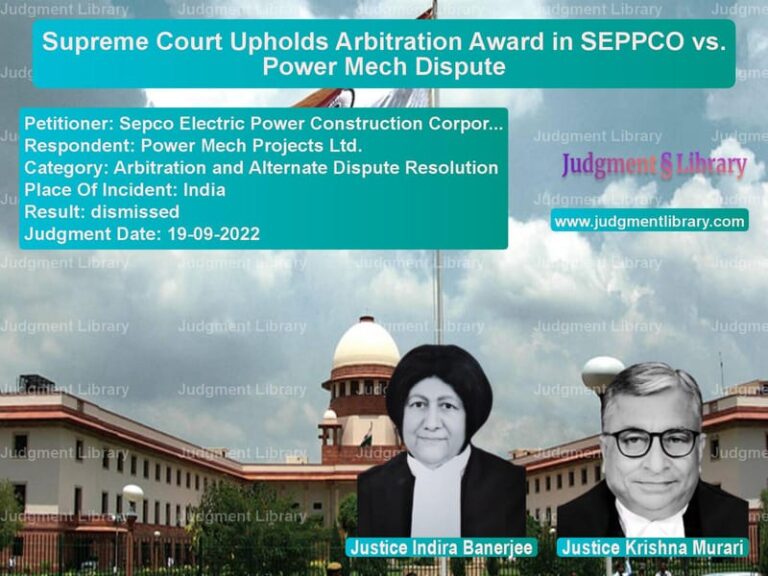Food Corporation of India Wins: Supreme Court Denies Paddy Allocation to Blacklisted Mills’ Lessees
The Supreme Court of India, on March 6, 2020, ruled in favor of the Food Corporation of India (FCI) in a case concerning the allocation of paddy for custom milling. The case involved rice millers who were blacklisted due to the supply of sub-standard rice and their subsequent attempts to circumvent the ban by leasing their mills to new entities. The Court set aside the Punjab and Haryana High Court’s ruling, which had allowed the new lessees to receive paddy allocation.
Background of the Case
The controversy arose during the Kharif Marketing Season (KMS) of 2004-05 when government agencies allocated paddy to rice mills for custom milling. The milled rice was then supplied to the FCI under specified quality standards. However, quality issues led to a Central Bureau of Investigation (CBI) probe, which found that several mills had supplied defective rice. As a result, 182 mills were blacklisted for a period of three to five years, depending on the severity of their violations.
In response, the owners of these blacklisted mills leased their premises to new firms, which then sought paddy allocation from the FCI. The FCI refused these requests, arguing that the leases were sham transactions intended to circumvent the ban. The lessees challenged this decision in the Punjab and Haryana High Court, which ruled in their favor, leading to the appeal before the Supreme Court.
Legal Proceedings
FCI’s Arguments
- The FCI contended that the leases were not genuine and were merely an attempt by the blacklisted millers to bypass the ban.
- It argued that the lease deeds were unregistered, violating Section 17(1)(d) of the Registration Act, 1908, and thus could not be relied upon as evidence of legitimate transfer of rights.
- The FCI maintained that liabilities for previous defaults remained with the original millers and should not be evaded by leasing out the mills.
- The Corporation emphasized that the lessees were newly constituted entities with no prior experience in rice milling, raising further doubts about the authenticity of the transactions.
Respondents’ Arguments (Lessees)
- The lessees argued that they were separate legal entities distinct from the blacklisted millers.
- They maintained that the FCI had no legal authority to impose restrictions on their eligibility for paddy allocation.
- They contended that their lease agreements were valid and should not be questioned by third parties.
- The lessees claimed that they had no role in the previous defaults and should not be penalized for the actions of their lessors.
Supreme Court’s Observations
1. Invalidity of Lease Deeds
The Supreme Court found that the lease deeds presented by the lessees were unregistered, making them legally inadmissible under the Registration Act, 1908. The Court held:
“No reliance can be placed upon the lease deeds allegedly executed between the defaulting rice miller(s) and the respondent(s), as they do not satisfy the statutory requirements of Section 17(1)(d) of the Registration Act, 1908.”
2. Sham Transactions
The Court agreed with the FCI’s argument that the lease transactions were not bona fide and were merely an attempt to circumvent the blacklisting. It observed:
“The plea taken by the appellant-FCI, that such documentation was made only to escape the liability fastened on the defaulting rice millers, carries some weight.”
3. Transfer of Liabilities
The Court held that even if a valid lease arrangement existed, the lessees could not be absolved of the liabilities incurred by the previous millers. It ruled:
“No right to seek allocation of paddy can be claimed by an entity unless the liabilities arising out of the previous bilateral agreement are satisfied.”
4. High Court’s Error
The Supreme Court found that the High Court erred in setting aside the FCI’s decision. It criticized the High Court for failing to consider the broader implications of allowing such transactions, stating:
“The High Court ought to have refrained from opining on the sufficiency of such lease deeds for recognition of a new legal entity and consequential non-transfer of liability to the lessees.”
Final Verdict
The Supreme Court ruled in favor of the FCI and set aside the High Court’s order. It held that the lessees could not claim paddy allocation unless they cleared the dues and penalties of the previous millers. The Court provided a limited relief by allowing the lessees to apply for allocation after obtaining a ‘No Dues Certificate.’
“The writ petitions filed by the respondent-lessees are dismissed, however, with liberty to pay dues with penalty/interest of the original rice-millers and thereafter, on production of a ‘No Dues Certificate,’ seek allocation of paddy for custom milling in accordance with the policy of FCI.”
Implications of the Judgment
- The ruling strengthens regulatory oversight over food procurement processes and prevents blacklisted entities from circumventing penalties through sham transactions.
- It reinforces the requirement for proper documentation, particularly in lease transactions involving government contracts.
- The judgment clarifies that liabilities cannot be avoided merely by transferring assets to a new legal entity.
- It upholds the authority of the FCI in ensuring compliance with food safety and quality regulations.
Petitioner Name: Food Corporation of India & Another.Respondent Name: M/s. V.K. Traders & Others.Judgment By: Justice S. A. Bobde, Justice B. R. Gavai, Justice Surya Kant.Place Of Incident: Punjab.Judgment Date: 06-03-2020.
Don’t miss out on the full details! Download the complete judgment in PDF format below and gain valuable insights instantly!
Download Judgment: Food Corporation of vs Ms. V.K. Traders & Supreme Court of India Judgment Dated 06-03-2020.pdf
Direct Downlaod Judgment: Direct downlaod this Judgment
See all petitions in Corporate Compliance
See all petitions in unfair trade practices
See all petitions in Judgment by S. A. Bobde
See all petitions in Judgment by B R Gavai
See all petitions in Judgment by Surya Kant
See all petitions in allowed
See all petitions in supreme court of India judgments March 2020
See all petitions in 2020 judgments
See all posts in Corporate and Commercial Cases Category
See all allowed petitions in Corporate and Commercial Cases Category
See all Dismissed petitions in Corporate and Commercial Cases Category
See all partially allowed petitions in Corporate and Commercial Cases Category







